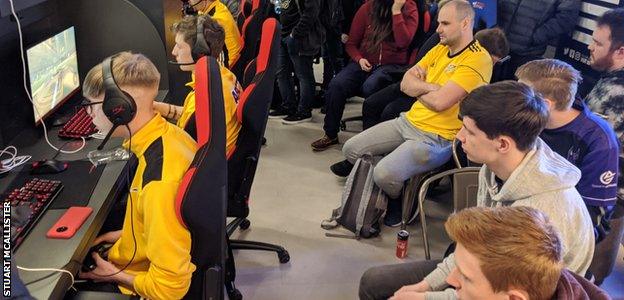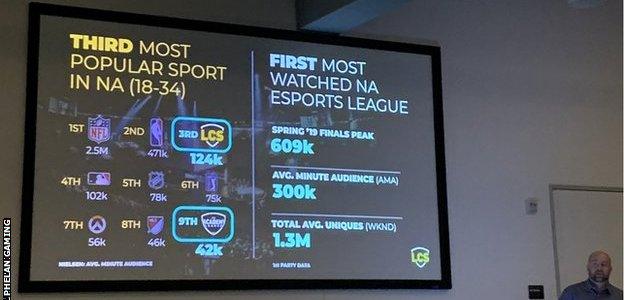Esports: Competitive gaming on the rise as lockdown flips sport on its head
- Published

2019 BBC Sports Personality of the Year Ben Stokes swapped cricket for esports during lockdown, finishing last in the F1 Virtual Grand Prix
In recent weeks, we have seen Ferrari's Charles Leclerc win a virtual Grand Prix, Manchester United's Marcus Rashford in a virtual football battle against Borussia Dortmund's Jadon Sancho.
We have also seen the launch of Fifa's Stay and Play Cup, which will involve players from 20 of Europe's biggest football clubs.
As 'normal' sport has ground to a halt around the world, esports has seen a rise in both participation and viewing figures as stay at home mandates were issued globally.
It is an industry that has been on the rise year on year, and some predict the current isolation measures could provide an extra boost.
"What's interesting right now is how traditional sports are using sports simulation to reach and engage with their fans," says Trev Keane, head of sport and esport at 7F.
"In the last few weeks we've seen Formula One, Nascar, football clubs, football players and the NBA among others all do that. It's that shift that's really become very interesting and the industry has proved how resourceful it is.
"Companies are looking at ways of keeping their brands alive and to potentially give them another revenue source.
"I think what we'll see on the back of this is that more club owners, especially in the UK and Europe, will see esports as a viable investment option.
"We've seen that a lot in the States and I think we'll probably see that explored more now.

Stuart McAllister's Nuclear Storm Gaming team recently won a LAN event at the Belong Gaming Arena in Ballymena
"Sadly, we are in the middle of a worldwide crisis and without putting too much of a positive spin on things, it's interesting from an esports perspective that we could see significant growth and it is a bit exciting in that regard,".
As well as growing participation figures, there has also been a huge rise in audience figures - from fans who simply enjoy watching, to gamers using the extra time they now find themselves with to watch on in the hope of picking up some tips and tricks.
"There's definitely an opportunity at the moment, esports is a massive industry to get involved in," says Belfast's Stuart McAllister, owner of Nuclear Storm Gaming.
"The people who usually only get to game casually are gaming constantly at the moment and there's a huge appetite for it and a massive audience.
"A new game recently came out and usually when this happens, the game company would pay a lot for promotion. But they didn't need to and without any paid promotion, 1.6 million people were watching on Twitch alone when it launched.
"From a business point of view, this is a huge audience with so much potential for advertising and promotion."
A full-time profession?
As the participation and popularity of esports continues to rise, various structures are beginning to be put in place in order to support the industry's continued growth.
Ireland Esports is a recently formed governing body who are focused on increasing the level of awareness around gaming and esports, education, improving standards and inspiring future talent.
As well as this, universities including the University of Ulster are supporting the development of the industry through esports societies.
"The scene is still developing in Ireland, but it is becoming a lot more professional," according to Ciaran Walsh, CEO of Phelan Gaming.
"There is a structured university competition for the colleges across Ireland and there are lots of other amateur competitions. I think once people fully realise the potential of esports, there will be more support put in place for it.
"The current situation we find ourselves in has definitely helped to shine the light on it a bit more.
"I definitely think it can become a career path for some people. It's going to take the same level of commitment though than any other sport.
It's going to require having strong connections, expecting and dealing with lots of ups and downs etc. Players are going to have to really work at it to make it work as a career."
The dangers of 'the grind'
The work required to make it as an elite gamer and the high levels of burnout among some of those operating at the high levels has been the cause of some concern, raising various questions about mental health and gaming.
This very issue is something that inspired Bangor based entrepreneur Ryan Scallon to launch his business G Science, which aims to support gamers in all aspects of their career and development.
"Some esports athletes are training for eight to 12 hours a day. They often also have a demanding travel schedule," says Scallon.

The figures for both playing and viewing esports have increased considerably during lockdown
"Esports athletes also have something called 'the grind' where they get on the game and they play it for as long as they can - just play, play, play. It's unstructured training. The grind is giving kudos, you're seen as a bit of a legend the more you 'grind'.
"If you take all of that into consideration, I'm not surprised we are seeing players at the highest level suffer from burnout, high levels of poor physical and mental health and injury.
"What we're trying to do is encourage athletes to take a healthier approach to gaming.
"To help them understand that if they have a more structured, healthier regime in place, not only will they be better gamers, by working on areas that they need to work on, alongside a coach, but also that they will be much healthier, with better nutrition, sleep etc. and through this, they will be better placed to reach their full potential.
"Without the athletes and the players, you have no esports, just like any traditional sport. So, we have to invest in their health and understand the things that will affect it.
"If you're physically and mentally well, of course you will perform better, so we need to create an environment that fosters and supports the players."
Taking things to an Olympic level
The inclusion of esports at the Asian Games in 2018 and the record number of viewers the competition attracted promoted questions as to whether there would be some kind of world class event staged in the future - maybe even an Olympic esports competition.
Whether it is Olympic affiliated or not, there is a unanimous opinion that such an event is not too far away.
"Honestly, I think there will be some kind of world or high-level competition. I'm not exactly sure what, as different regions would play different games," says Walsh.
"But I do think something will happen in terms of the Olympics or something like it. It would bring the games a whole new audience and an audience that they're trying to attract, so it makes sense."